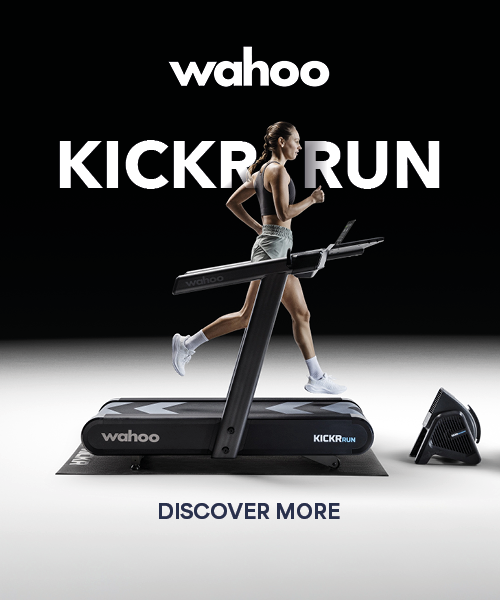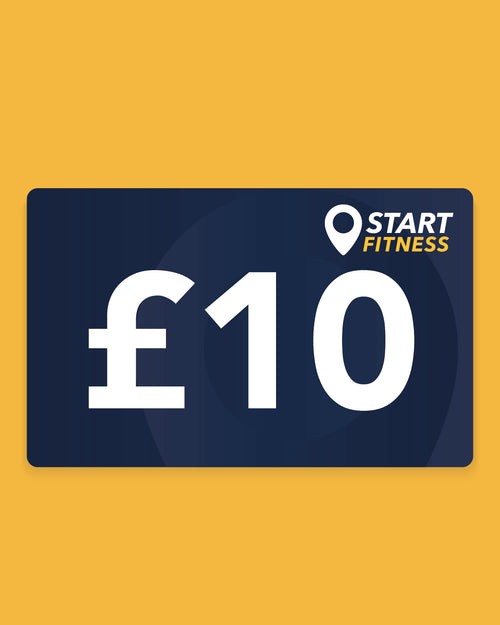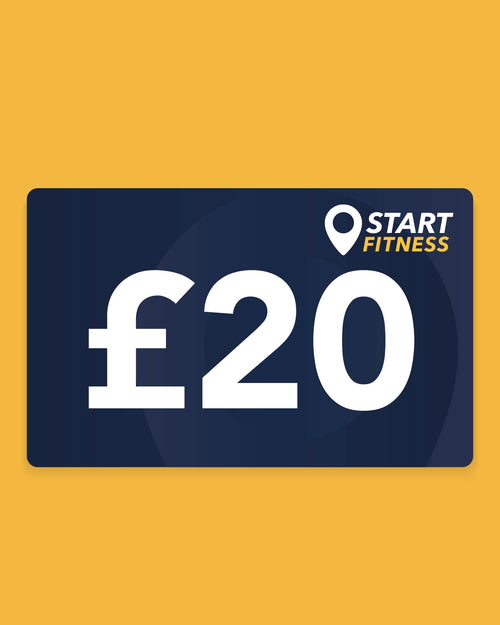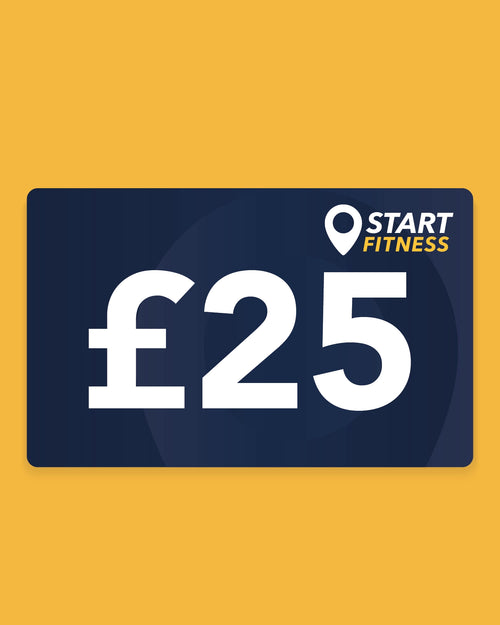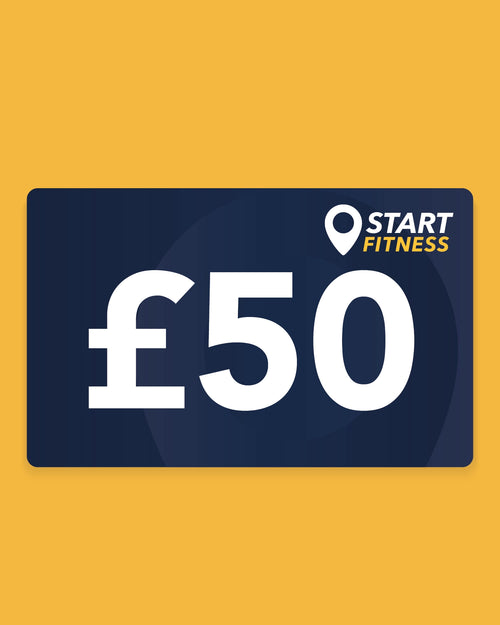Fuelling your body with the right nutrients is just as important as your training when it comes to running. Whether you're a beginner hitting the pavement for the first time or a seasoned marathoner chasing a personal best, proper nutrition plays a crucial role in achieving optimum performance and recovering faster. The composition of your diet, the timing of certain nutrients and the quantities it takes to support your body throughout running are essential to maintaining and improving your performance and overall lifestyle.
Throughout this guide, we will break down everything you need to know about nutrition as a runner, from carb-loading the day before a race to staying hydrated throughout and consuming the right post-run recovery foods. With our expert tips and practical advice, you’ll learn how to optimise your diet to boost energy, prevent injuries, and keep your body running strong, mile after mile.
What should I eat before a run?
If you're looking to up your mileage or beat your PB you must be fuelling your body properly before, during, and after your run. Perfecting your preparation is the key to giving you enough energy to sustain you throughout your run. Of course, depending on your dietary requirements, general health and personal taste preferences, pre-run meals will vary.
The amount and type of food you should eat before a run will all depend on the length and intensity of the run you plan to do. If you’re planning on running long distances, you will need to ensure that you consume a lot of carbohydrates the night before in order to fill your glycogen stores and give your body enough energy to use throughout the run the next day. These meals typically consist of starchy carbs like pasta that are easy to digest and gentle on the stomach. Other carbs such as rice, potatoes and bread are also good sources of energy. We suggest pairing these carbs with a good source of protein and fat to give you a satiating, nutritionally complete meal.
When it comes to eating on the day of a run, a light snack that is easy to digest but will still give you energy is best. Foods that contain a good amount of complex carbs but are lower in fat and protein are best for pre-run meals, this includes foods such as:
-
Bananas for a simple energy source and potassium for muscle recovery
-
Porridge for a filling meal with a slow-release of energy
-
Bagels or toast with nut butter for added protein as well as carbs
-
Energy bars
-
Sandwiches with a simple protein source like turkey and cheese
We suggest avoiding foods that are spicy, salty or too rich in order to avoid possible stomach issues or further dehydration throughout your run. Try out various food combinations and portion sizes to find out what works best for your body.
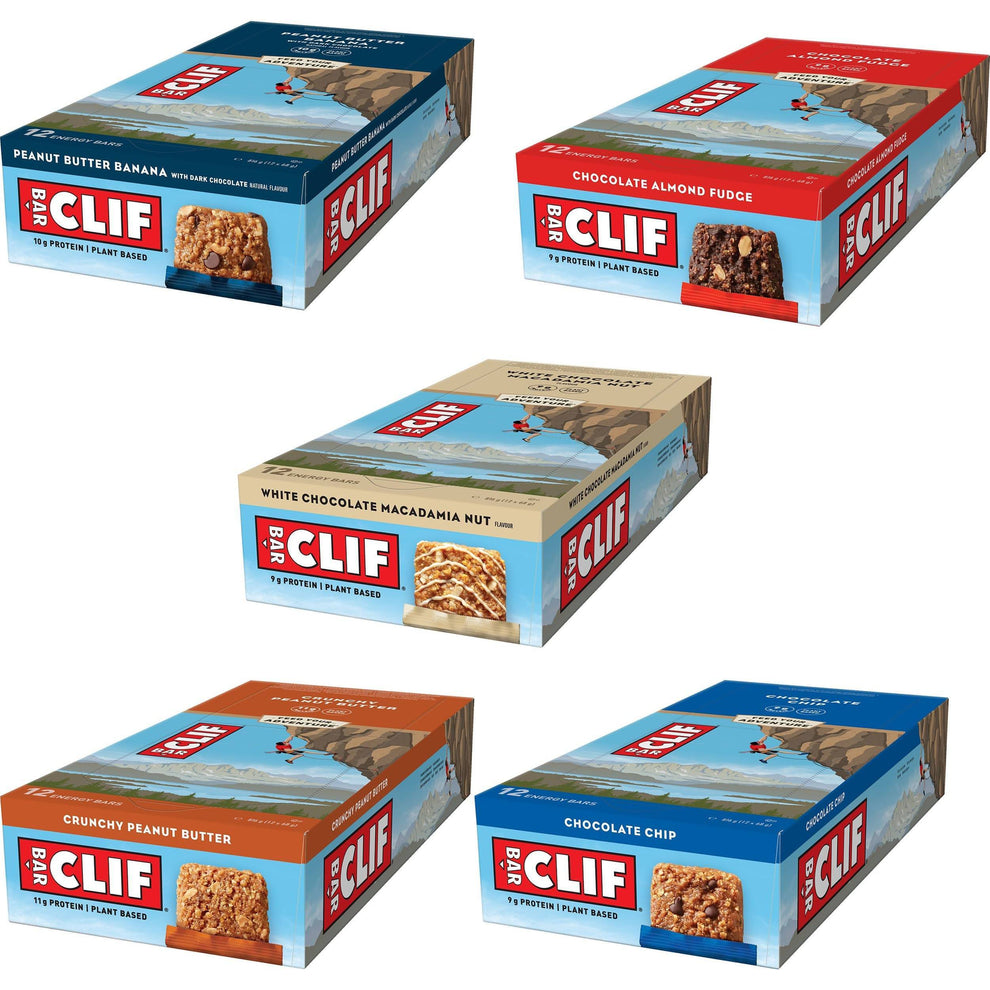 |
| Clif Energy Bars |
Clif Energy Bars are made with whole ingredients such as organic rolled oats, dates and plant-based proteins designed to deliver energy, protein and fibre easily. Whether you’re fuelling up before a 5k or looking for an energy boost after a long run, these energy bars are made to contribute to the normal release of energy and help you sustain your pace. Each bar contains vitamins B6 and B12 which also help with the natural release of energy, supplying your working muscles with everything they need to work optimally in extended periods of activity.
For best results, we recommend eating Clif bars about one to three hours before exercising, however, they can also be eaten during lower-intensity exercises to help satiate hunger or between meals during a busy day.
How long before a run should I eat?
If you are heading out on a run first thing in the morning, we recommend eating a small snack such as a banana or energy bar that is easy to digest and won’t feel heavy on your stomach but will still give you energy to sustain you throughout your run. After your morning run, we would then suggest eating a big meal filled with protein and carbs to bring your energy levels back up.
If you are running any other time of day, we would recommend consuming any meals 2-3 hours before your run to allow your body to fully digest the food. We would also suggest eating a small, easily digestible snack 1 hour before a run, so that your body has enough time to absorb the nutrients and digest without causing discomfort during your exercise.
If you have a sensitive stomach, you might need to wait longer after eating before running, this is why it's important to listen to your body and experiment with various snacks and foods to find what works best for you and your running routine.
How do I stay hydrated on long runs?
When running it’s important to drink more fluids than usual as when your body starts to warm up you will lose a considerable amount of water through sweat. Becoming dehydrated when running not only affects your performance but can also make you more susceptible to cramping as well as headaches, nausea and dizziness. It’s especially important to stay hydrated on longer runs to keep your body functioning optimally and to support your performance throughout.
To ensure you stay hydrated on long runs, it's important to pre-hydrate by drinking water regularly in the hours before your run. Throughout your run, sipping small amounts of water or an electrolyte drink frequently will keep you sufficiently hydrated. Although staying hydrated is important during exercise, it's best to listen to your body, drink only when you feel thirsty and be mindful about overhydrating. After your run, be sure to replenish your fluids with electrolytes to replace any minerals lost through sweat and to effectively rehydrate you.
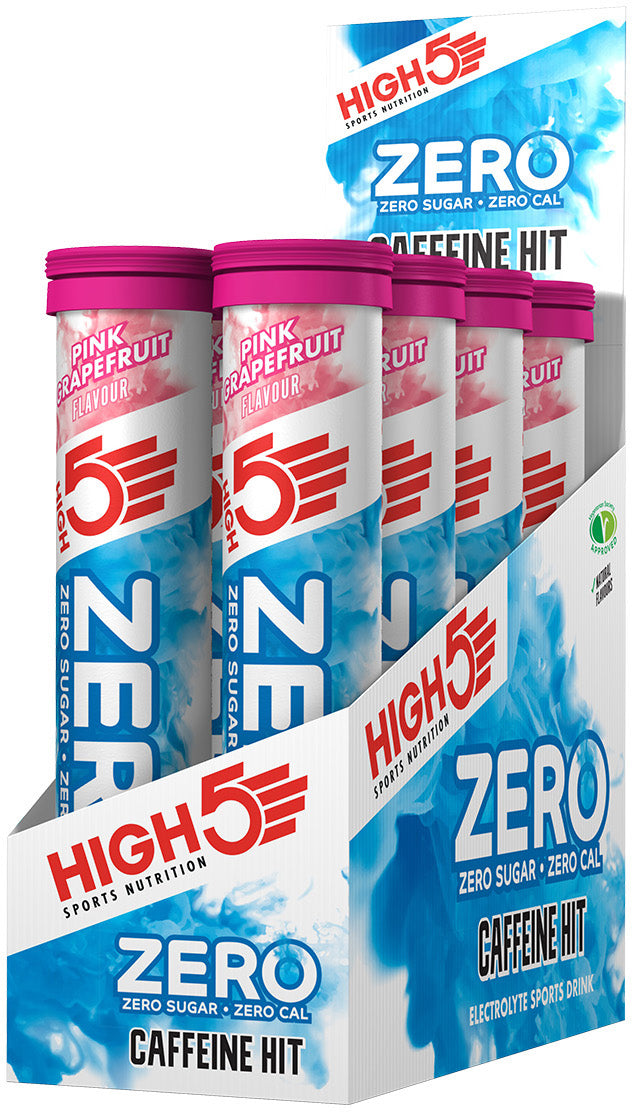 |
| Zero Caffeine Hit Electrolyte Hydration Sports Drink Tablets |
These essential electrolytes can be found in sports drinks, as well as in tablets or sachets of powder that can be mixed with water to create rehydration drinks easily at home. We recommend the Zero Electrolyte Hydration Tablets for quick and effective hydration pre and post-run. A refreshing, zero-calorie electrolyte drink with a sugar-free caffeine hit, these electrolyte tablets make it easy to stay hydrated.
Helping to replenish vital minerals like sodium and magnesium, electrolyte tablets give you what water alone can't. Ideal for those taking part in long runs, the caffeine in these supplements helps to increase endurance, which helps to push you further. This specific formula also includes vitamin C which helps to support a healthy immune system and reduce tiredness and fatigue. Designed to be taken before, during and after exercise, simply dissolve one of these tablets into a glass of water for a great-tasting, hydrating electrolyte drink.
How to boost energy during a run?
Running takes a lot of energy, especially if you’re taking part in a long-distance run, therefore, it's important to know how to boost your energy throughout to maintain performance. The key to keeping energy levels up during a run is to hydrate properly with regular water breaks, preferably with added electrolytes, and to consume readily available carbohydrates like bananas and energy gels or bars. These will keep your body adequately fuelled which will improve running efficiency and prevent fatigue.
If needed, small amounts of caffeine can also provide a temporary energy boost. Most energy gel sachets contain caffeine which can help you push through when the run starts to get tiring. One of the best energy gels we recommend is the Go Energy Gel Plus.
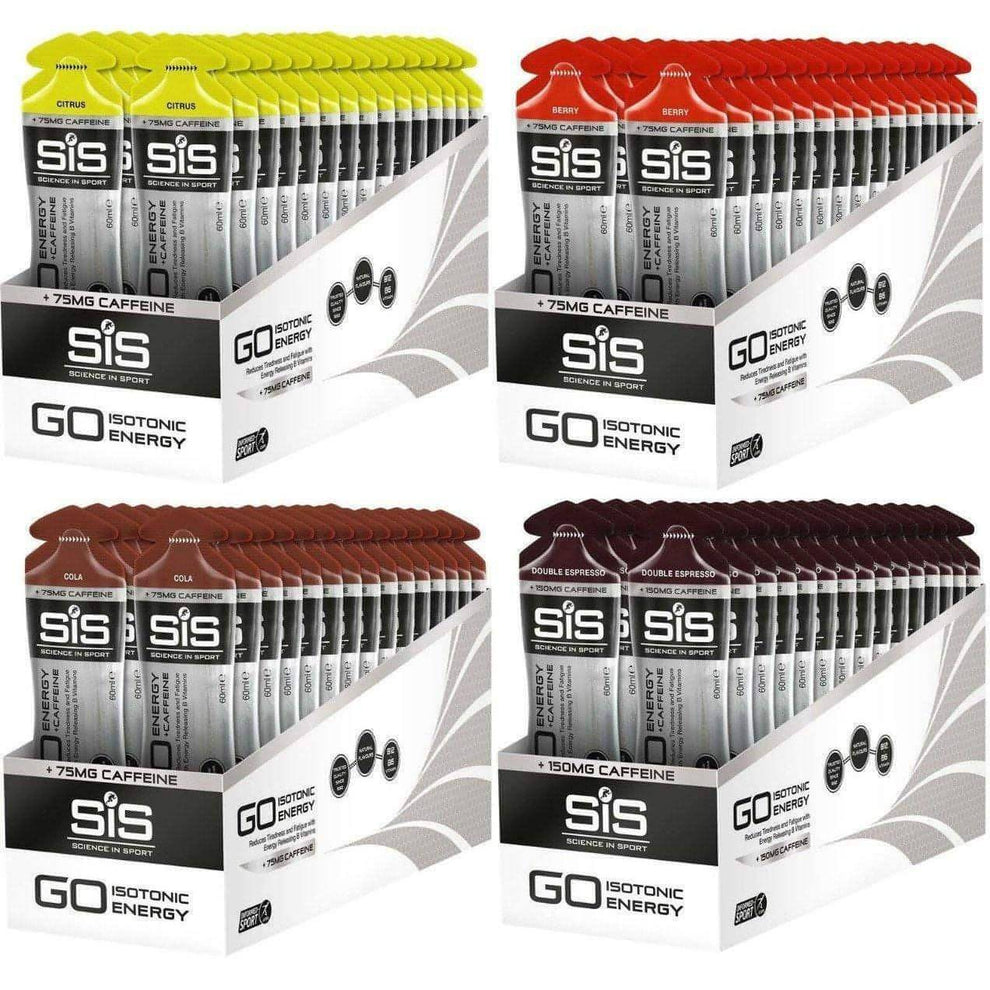 |
| Go Energy Gel Plus Caffeine |
The best energy gels for running are ones that not only give you a boost but hydrate you at the same time. These Sis Go energy gels are the world's first and only truly isotonic gel that provides 22g of carbohydrates and 75mg of caffeine per gel along with essential electrolytes. Perfect for high-intensity races, these gels are formulated to deliver energy quickly and effectively, helping to prevent both mental and physical fatigue throughout running.
Available in many delicious flavours, they’re conveniently packaged to grab and go, fitting effortlessly into your running vest or pocket for you to reach when you need that extra boost.
What are the best post-run snacks?
With a lot of attention centred around what to eat before running and during to keep your energy up, what you eat afterwards is often overlooked, but is equally important. Depending on what your goals are when it comes to running, whether you’re looking to lose weight, gain muscle or prepare for a long-distance run, the food that is recommended to consume post-run can differ. However, generally speaking, foods that are rich in carbohydrates, proteins, and essential fats are the best for aiding in the recovery process and replenishing energy stores.
This includes foods such as lean meats, whole grains, fruits, and vegetables. Bananas in particular are a great post-run snack as they are a simple carb with potassium that can help prevent muscle cramps. The best post-run snack is one that contains a mix of carbohydrates and protein to support muscle growth and maintenance. We suggest a hearty pasta dish filled with a protein source and healthy fats for a well-rounded post-run meal.
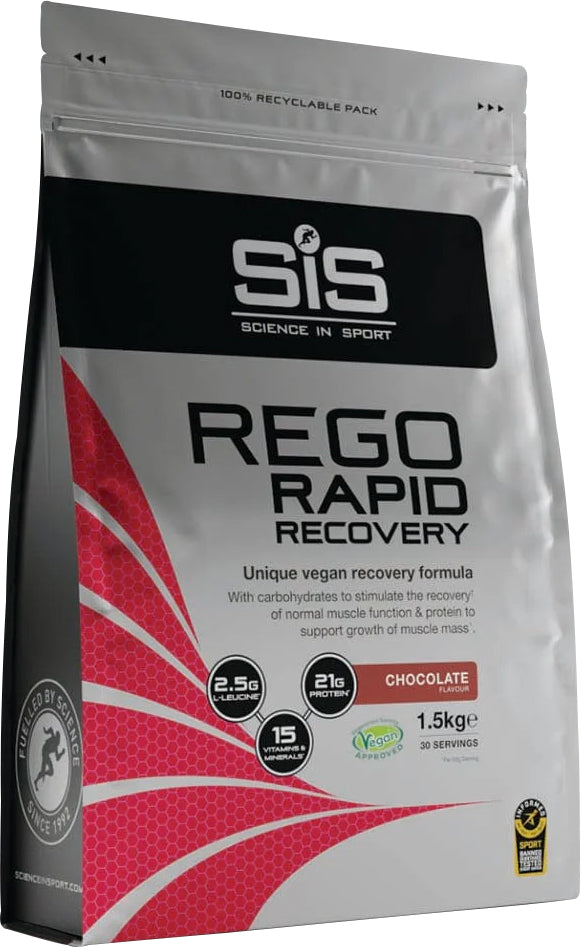 |
| REGO Rapid Recovery Drink |
As well as ensuring you get your post-run meals right, replenishing lost fluids is also important to recover after intense exercise. This REGO Rapid Recovery Drink is made to be consumed immediately after exercise. Containing a blend of 22 grams of carbohydrates and 20 grams of protein with added electrolytes and vitamins, this rapid recovery drink helps to replenish glycogen stores and protein to help you get the most from your training and prepare you for your next run.
Get the running fuel you need at Start Fitness
To ensure optimum performance and to help you hit your personal bests, browse through our full sports nutrition range to find the right products to fit your nutritional needs.


